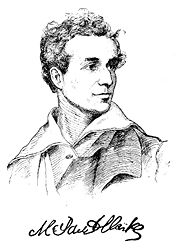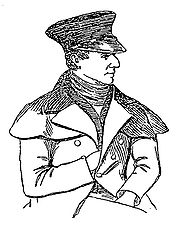
McDonald Clarke
Encyclopedia


New York City
New York is the most populous city in the United States and the center of the New York Metropolitan Area, one of the most populous metropolitan areas in the world. New York exerts a significant impact upon global commerce, finance, media, art, fashion, research, technology, education, and...
in the early part of the 19th century. He was an influence on, and eulogized by Walt Whitman
Walt Whitman
Walter "Walt" Whitman was an American poet, essayist and journalist. A humanist, he was a part of the transition between transcendentalism and realism, incorporating both views in his works. Whitman is among the most influential poets in the American canon, often called the father of free verse...
; but widely known as "the mad poet of Broadway
Broadway (New York City)
Broadway is a prominent avenue in New York City, United States, which runs through the full length of the borough of Manhattan and continues northward through the Bronx borough before terminating in Westchester County, New York. It is the oldest north–south main thoroughfare in the city, dating to...
", a label with which he identified. He is, arguably, an early example of an outsider artist
Outsider Art
The term outsider art was coined by art critic Roger Cardinal in 1972 as an English synonym for art brut , a label created by French artist Jean Dubuffet to describe art created outside the boundaries of official culture; Dubuffet focused particularly on art by insane-asylum inmates.While...
.
Biography
McDonald Clarke was born in Bath, MaineBath, Maine
Bath is a city in Sagadahoc County, Maine, in the United States. As of the 2000 census, the city population was 9,266. It is the county seat of Sagadahoc County. Located on the Kennebec River, Bath is a port of entry with a good harbor. The city is popular with tourists, many drawn by its...
on June 18, 1798, apparently the illegitimate son of a ship-merchant.
His mother, by his account, died at sea when he was 12; but little is known of his early life beyond the fact that he and the poet Brainard
John Gardiner Calkins Brainard
John Gardiner Calkins Brainard was an American lawyer, editor and poet.-Biography:John Brainard was born in New London, Connecticut in October 1796, son of Jeremiah G. Brainard, formerly a judge of the Connecticut Superior Court...
were playmates. He resided in Philadelphia for a time, reportedly sleeping in the grave-yard at Franklin's monument
Franklin Square (Philadelphia)
Franklin Square is one of the five original open-space parks planned by William Penn during the late 17th century in central Philadelphia, Pennsylvania.- History :...
. By 1819 he had moved to New York city where he sought to establish himself as a journalist and poet, but scraped by in varying degrees of poverty. Penniless, he eloped with and married an actor, a Miss Brundage, greatly against the wishes of her mother. The marriage faltered, seemingly largely because of his inability to earn a living or keep lodgings, and quickly ended in divorce.
He became a familiar and striking figure on Broadway, and well known as an eccentric character. Clarke was an imitator of Byron
George Gordon Byron, 6th Baron Byron
George Gordon Byron, 6th Baron Byron, later George Gordon Noel, 6th Baron Byron, FRS , commonly known simply as Lord Byron, was a British poet and a leading figure in the Romantic movement...
and copied his airs and costumes, but not – as the New York Times archly put it – his verses.
Higgins suggests he embraced the mad poet role, in part as a means of entry into New York literary circles, and "clearly relished his role as jester"; but later downplayed the role.
Although he managed to produce work throughout his life, his mental health was fragile and failing. His character was described as "innocent as a child", imbued with a mystic romanticism, and by common consent, he had no vices, but always preserved a gentility of deportment, was inoffensive, and always mild, always happy. He was a regular attendant at the fashionable Episcopal Grace church on Broadway. His oddities, as his friend Fitz-Greene Halleck
Fitz-Greene Halleck
Fitz-Greene Halleck was an American poet notable for his satires and as one of the Knickerbocker Group. Born and reared in Guilford, Connecticut, he went to New York City at the age of 20, and lived and worked there for nearly four decades. He was sometimes called "the American Byron"...
stated, were all amiable. Nevertheless after the breakdown of his marriage his behavior became wilder and could give rise to alarm, particularly when he became fixated on and followed young women around the city. "His whole life was in fact a restless seeking for other half", according to biographer L. Maria Child.
In the early part of his career he subsisted, barely, on the proceeds of his published books. Later he relied on the sale of poems to newspapers, journals and magazines, but was rarely able to keep a roof over his head, and in a letter to the New York Evening Post was described as "a poetic scintillator of some what odd fancies, who kept the town laughing while he was sometimes starving." He is described as often being reduced to sleeping between two graves in Trinity churchyard, and surviving on crackers and milk.
He drowned on 5 March 1842 in a cell of the city prison by water from an open faucet. A policeman had found him in a destitute and apparently demented condition on the street and taken him to a jail for safety; but this triggered a mental collapse which saw him removed to an asylum. The immediate catalyst for the mental chain of incidents which brought about his death was the culmination of a cruel prank played on him by a group of youths, who elaborately convinced him that a certain woman for whom he longed was in love with him, before letting him down in the most abrupt fashion.
He was celebrated in life in an amusing poem called "The Discarded," written by Halleck, but it was upon Walt Whitman that he made the greatest impression. He penned a lengthy eulogy for Clarke in the Aurora, another article four days later praising him, and on March 16 published a poem, The Death and Burial of McDonald Clarke: A Parody, in the same magazine.
Autobiography
A fragment of autobiography in his own handwriting, penned two months before his death, is still preserved. It reads:
"Begotten among the orange-groves, on the wild mountains of Jamaica, West Indies. Born in Bath, on the Kennebec River, State of Maine, 18th June, 1798. 1st Love, Mary H. of New London : last love, Mary T. of New York ; intermediate sweethearts without number. No great compliment to the greatest Poet in America should like the change tho' ; had to pawn my Diamond Ring (the gift of a lady), and go tick at Delmonico's for Dinner. So much for being the greatest Poet in America. The greatest Poet of the Country ought to have the freedom of the City, the girls of the gentry gratis, grab all along shore, the magnificent Mary, and snucks with all the sweet Sisters of Song."
Works
In the eulogy, Whitman wrote:
"Whoever has power, in his writing, to draw bold, startling images, and strange pictures – the power to embody in language, original, and beautiful, and quaint ideas – is a true son of song. Clarke was such an one; not polished, perhaps, but yet one in whose faculties that all important vital spirit of poetry burnt with a fierce brightness.... We always, on perusing Clarke's pieces, felt, in the chambers of the mind within us, a moving and responding, as of harp cords, struck by the wind.
Clarke's most celebrated couplet is often used as a quotation:
"Now twilight lets her curtain down,
And pins it with a star."
It is also frequently quoted in the following form:
"Night dropped her sable curtain down, and
pinned it with a star."
Publications
- A Review of the Eve of Eternity, and other Poems (New York, 1820)
- The Elixir of Moonshine, by the Mad Poet (1822)
- The Gossip (1825)
- Poetic Sketches (1826)
- The Belles of Broadway (1833)
- Death in Disguise, a temperance poem (1833)
- Poems (1836)
- Cross and a Coronet (1841)

